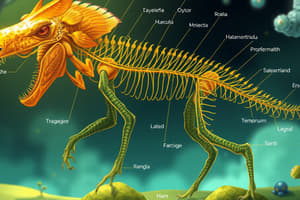Podcast
Questions and Answers
How many domains are there? List them all.
How many domains are there? List them all.
3 Domains: Bacteria, Archaea, Eukarya
How many kingdoms are there? List them all.
How many kingdoms are there? List them all.
6 Kingdoms: Eubacteria, Archaebacteria, Protista, Plantae, Animalia, Fungi
What kind of cell does each domain have?
What kind of cell does each domain have?
Bacteria and Archaea have prokaryotic cells, Eukarya has eukaryotic cells.
What are the 8 levels of classification from general to specific?
What are the 8 levels of classification from general to specific?
What is the definition of classification?
What is the definition of classification?
What is taxonomy?
What is taxonomy?
What is morphology?
What is morphology?
What is a scientific name (bionomial nomenclature)?
What is a scientific name (bionomial nomenclature)?
The scientific name must be ______.
The scientific name must be ______.
What is the rule for scientific names?
What is the rule for scientific names?
What is a domain in taxonomy?
What is a domain in taxonomy?
What is a kingdom in taxonomy?
What is a kingdom in taxonomy?
What is phylum in taxonomy?
What is phylum in taxonomy?
What is class in taxonomy?
What is class in taxonomy?
What is order in taxonomy?
What is order in taxonomy?
What is family in taxonomy?
What is family in taxonomy?
What is genus in taxonomy?
What is genus in taxonomy?
What is species in taxonomy?
What is species in taxonomy?
What is Archaea?
What is Archaea?
What is Bacteria?
What is Bacteria?
What is Eukarya?
What is Eukarya?
What is Archaebacteria?
What is Archaebacteria?
What is Eubacteria?
What is Eubacteria?
What is Protista?
What is Protista?
What is Fungi?
What is Fungi?
What is Animalia?
What is Animalia?
What is Plantae?
What is Plantae?
Flashcards are hidden until you start studying
Study Notes
Domains of Life
- Three domains: Bacteria, Archaea, and Eukarya.
- Bacteria and Archaea consist of prokaryotic cells; Eukarya contains eukaryotic cells.
Kingdoms of Life
- Six kingdoms: Eubacteria, Archaebacteria, Protista, Plantae, Animalia, and Fungi.
Taxonomy Classification
- Eight levels of classification in order: Domain, Kingdom, Phylum, Class, Order, Family, Genus, Species.
- Mnemonic for classification: "Did King Philip Come Over For Great Spaghetti?"
Classification Definition
- Organisms are classified based on physical characteristics and genetic relationships.
Taxonomy
- Sub-discipline of biology focused on identifying, naming, and classifying organisms.
Morphology
- Study of the form and structure of organisms.
Scientific Naming (Bionomial Nomenclature)
- Scientific names consist of two parts: genus and species.
- Naming rules: italicize or underline the entire name, capitalize the genus name, and use a lowercase letter for the species name.
Detailed Taxonomic Ranks
- Domain: Highest taxonomic rank above kingdom, includes Archaea, Bacteria, and Eukarya.
- Kingdom: Second highest rank, includes Animalia, Plantae, Fungi, Protista, Archaebacteria, and Eubacteria.
- Phylum: Classification above class and under kingdom.
- Class: Rank above order and under phylum.
- Order: Classification above family and under class.
- Family: Rank above genus and under order.
- Genus: Classification above species and under family.
- Species: Basic unit of classification below genus.
Domains Explained
- Archaea: Ancient prokaryotes, unicellular, related to kingdom Archaebacteria, often found in extreme environments.
- Bacteria: True bacteria, unicellular prokaryotes, associated with kingdom Eubacteria, forms the most common bacteria.
- Eukarya: Comprises all organisms with a nucleus including protists, plants, fungi, and animals.
Kingdoms Detailed
- Archaebacteria: Unicellular prokaryotes, some produce methane, thrive in extreme conditions such as high temperature and pressure.
- Eubacteria: Unicellular prokaryotes, encompasses the majority of bacteria found in various environments.
- Protista: Eukaryotic kingdom that includes unicellular and multicellular organisms that are neither plants, animals, nor fungi (e.g., Amoeba, Euglena).
- Fungi: Multicellular organisms that decompose organic material to obtain nutrients (e.g., mold, mushrooms, yeast).
- Animalia: Complex, multicellular organisms lacking cell walls, which can move and respond to their environment (e.g., mammals, birds, insects).
- Plantae: Complex, multicellular organisms that photosynthesize using sunlight, characterized by green color and cellulose cell walls (e.g., ferns, flowering plants).
Studying That Suits You
Use AI to generate personalized quizzes and flashcards to suit your learning preferences.




